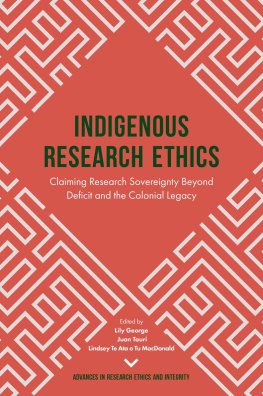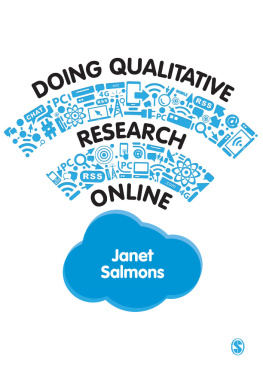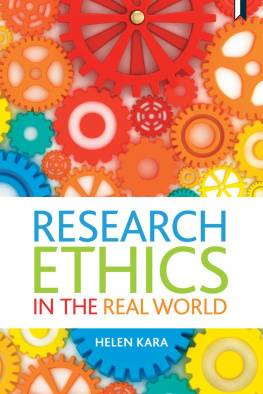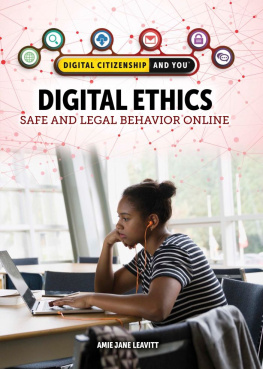THE ETHICS OF ONLINE RESEARCH
ADVANCES IN RESEARCH ETHICS AND INTEGRITY
Series Editor: Dr. Ron Iphofen FAcSS, Independent Consultant, France
Recent volumes:
Volume 1: | FINDING COMMON GROUND: Consensus in Research Ethics Across the Social Sciences. Edited by Ron Iphofen |
ADVANCES IN RESEARCH ETHICS AND INTEGRITY
Series Editor
Dr. Ron Iphofen FAcSS, Independent Consultant, France
Editorial Advisory Group
Professor Robert Dingwall FAcSS, Dingwall Enterprises Ltd and Nottingham Trent University, UK
Dr. Nathan Emmerich Queens University Belfast, UK
Professor Mark Israel University of Western Australia, Australia
Dr. Janet Lewis AcSS, Former Research Director, Joseph Rowntree Foundation, UK
Professor John Oates FAcSS, Open University, UK
Associate Professor Martin Tolich University of Otago, New Zealand
ADVANCES IN RESEARCH ETHICS AND INTEGRITY VOLUME 2
THE ETHICS OF ONLINE RESEARCH
VOLUME EDITOR
KANDY WOODFIELD
Samaritans, UK
United Kingdom North America Japan
India Malaysia China
Emerald Publishing Limited
Howard House, Wagon Lane, Bingley BD16 1WA, UK
First edition 2018
Copyright 2018 Emerald Publishing Limited
Reprints and permissions service
Contact:
No part of this book may be reproduced, stored in a retrieval system, transmitted in any form or by any means electronic, mechanical, photocopying, recording or otherwise without either the prior written permission of the publisher or a licence permitting restricted copying issued in the UK by The Copyright Licensing Agency and in the USA by The Copyright Clearance Center. No responsibility is accepted for the accuracy of information contained in the text, illustrations or advertisements. The opinions expressed in these chapters are not necessarily those of the Editor or the publisher.
British Library Cataloguing in Publication Data
A catalogue record for this book is available from the British Library
ISBN: 978-1-78714-486-6 (Print)
ISBN: 978-1-78714-485-9 (online)
ISBN: 978-1-78743-446-2 (Epub)
ISSN: 2398-6018 (Series)
This volume is dedicated to the members of the #NSMNSS community across the world who continue to push the boundaries of social science and internet mediated research by sharing their experiences and challenges as technology continues to transform how we live, and understand, our everyday lives.
CONTENTS
Kandy Woodfield and Ron Iphofen
Susan Halford
Matthew L. Williams, Pete Burnap, Luke Sloan, Curtis Jessop and Hayley Lepps
Sarah Quinton and Nina Reynolds
Wasim Ahmed, Peter A. Bath and Gianluca Demartini
Janet Salmons
Jenna Condie, Garth Lean and Brittany Wilcockson
Libby Bishop and Daniel Gray
Leanne Townsend and Claire Wallace
Steven Ginnis
Ron Iphofen
ABOUT THE AUTHORS
Wasim Ahmed is a Doctoral Researcher at the Information School, University of Sheffield. His PhD looks at understanding pandemics and epidemics on social media platforms. He has many years of experience in social media research working on a number of commercial and industry projects across academia, government, industry for companies such as Manchester United. He has published peer reviewed articles on social media, and has delivered a number of prestigious talks across the world. He runs his own analytics blog, and regularly posts on social media research for the LSE Impact blog with a readership in at least 136 countries. Wasim has an interdisciplinary background with an MSc in Information Systems, and a BA in Philosophy.
Peter Bath is Professor of Health Informatics, Head of the Information School, and Head of the Health Informatics Research Group at the University of Sheffield. As Chair of the University Research Ethics Committee (UREC), Peter was responsible for the review of University of Sheffields research ethics policy, which included new policy on the ethical issues relating to social media research. Peter is the Principal Investigator of the A Shared Space and a Space for Sharing project, a transdisciplinary project examining how people in extreme circumstances share information online. He is supervising a number of students who are utilising social media data as part of their PhDs. Peter has published over 200 papers/abstracts, including 116 articles in peer-reviewed journals.
Libby Bishop is currently working 80% at GESIS-Leibniz Institute for the Social Sciences in Cologne (Germany) where she is the Leader of the Data Security and Data Linkage Team in the Data Archive. The team is enhancing capacities for the Secure Data Center, including remote access to sensitive data and curation of new forms of data such as social media. With her 20% at the UK Data Service at the University of Essex (UK), Libby is a Manager in the Research Data Management section. She has expertise in the ethics of re-using data and informed consent. She also develops and delivers training on legal and ethical issues in sharing big data and on secondary analysis of qualitative data. During 2017, she is leading the Legal/Ethics strand of a CESSDA (Consortium of European Social Science Data Archives) Research Data Management project.
Pete Burnap is Reader in the School of Computer Science and Informatics, Cardiff University. He is an applied computer scientist with a principal focus on data and computational methods such as machine learning to model Web-enabled human and software behaviour contributing to the academic fields of Social Computing, Web Science and Cybersecurity. His research outcomes, which include more than 60 academic articles stemming from funded research projects worth over 8million, are organised and disseminated via the Social Data Science Lab, within which he is a director and the computational lead.
Jenna Condie is a Lecturer in Digital Research and Online Social Analysis at Western Sydney University, and a World Social Science Fellow on transformations to sustainable urbanisation for the International Social Science Council. Her research focuses upon how everyday experiences and social connections are mediated by digital technologies in the places we live, work, play and stay. As an experienced qualitative researcher, Jenna use methods that are participatory, critical, creative, and digital. Current projects include examining the use of social media by non-profit organisations, particularly within the social housing sector; how location-aware technologies are reworking our social relations; and how digital technologies can be harnessed for urban governance, particularly within urban planning and community safety initiatives.











